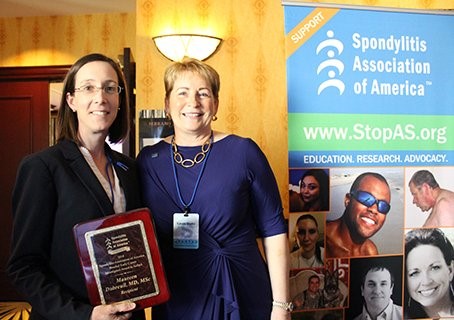(Boston)--Maureen Dubreuil, MD, MSc, assistant professor of Clinical Epidemiology Research & Training at Boston University School of Medicine (BUSM), is one of two recipients of the 2018 Spondylitis Association of America (SAA) Bruckel Early Career Investigator in Axial Spondyloarthritis Award.
Spondyloarthritis is a type of arthritis that attacks the spine and, in some people, the joints of the arms and legs. Dubreuil's research focuses on comorbidities and pharmacoepidemiology of spondyloarthritis. She is currently studying patient preferences and the cost-effectiveness of treatment modalities for this disease. The $20,000 award will help this ongoing research.
The award was created to recognize outstanding "contributions to the care and understanding of patients with spondyloarthritis." It was named in honor of the SAA's co-founder Jane Bruckel and is given annually to the early career investigator who shows the most promise to contribute to the understanding or therapy of axial spondyloarthritis.
One theme of Dubreuil's work is heart disease in spondyloarthritis. She led a study that examined the risk of heart attacks with non-steroidal anti-inflammatory drugs (NSAIDs) in spondyloarthritis patients, using a large database from the United Kingdom. The study found that specific NSAIDs may increase risk of heart attacks to a greater degree in people with spondyloarthritis than those with osteoarthritis. She is studying this same topic in other populations, including a large database in the United States. Dubreuil also collaborated on a study of the effects of statin (cholesterol medication) use in ankylosing spondylitis, finding that statins appear to have a more protective effect in people with ankylosing spondylitis than in the general population.
"A second theme of my work is understanding patients' preferences for treatments in spondyloarthritis," she explained. In 2016 she began work on a National Institutes of Health-funded project to assess factors that influence spondyloarthritis patients' preferences for medications. "In the coming year, I will begin work on a cost-effectiveness study, comparing different approaches to spondyloarthritis treatment, such as starting with an NSAID versus starting with a biologic medication."
###
Dubreuil is a member of the Spondyloarthritis Research and Treatment Network (SPARTAN), and of the Assessment of Spondyloarthritis International Society (ASAS), and serves on the Early Career Investigator Subcommittee of the American College of Rheumatology. In 2013, she was awarded the Arthritis Foundation Clinical to Research Transition Award and 2016, she began work on a K23-funded project to study patient preferences, and the cost-effectiveness of treatment modalities for spondyloarthritis, to inform both clinical care and policy decisions.


 Tuhina Neogi has been named as a co-PI for the American College of Rheumatology (ACR) Gout Treatment Guidelines Update.
Tuhina Neogi has been named as a co-PI for the American College of Rheumatology (ACR) Gout Treatment Guidelines Update. Boston University School of Medicine
Boston University School of Medicine